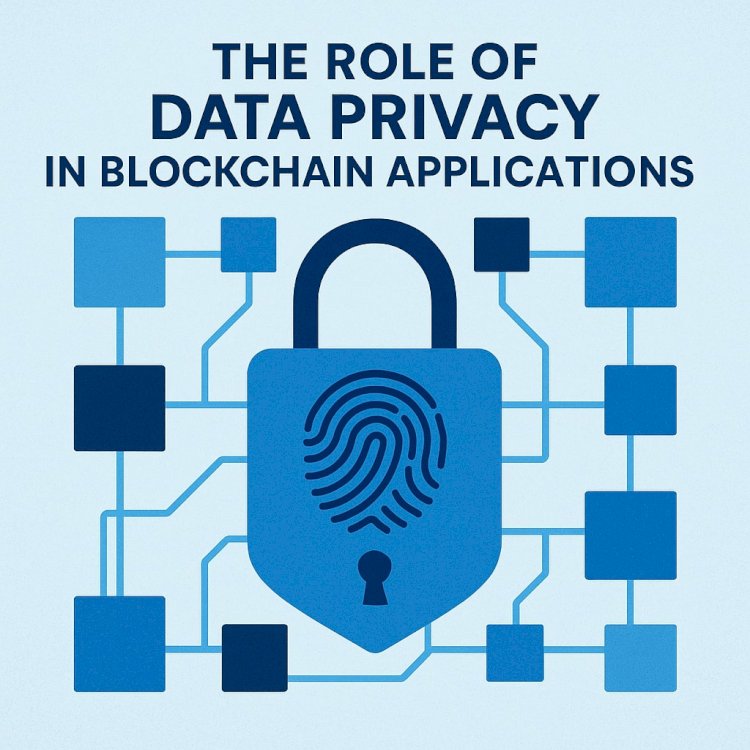The Role of Data Privacy in Blockchain Applications

By Dr. Pooyan Ghamari, Swiss Economist and Visionary
Blockchain technology is widely recognized for its transparency, immutability, and decentralized nature. Every transaction is recorded on a public ledger accessible to anyone, which provides accountability and trust. Yet, while transparency is a virtue, it also creates a paradox: how can blockchain protect sensitive information in an era where data privacy has become a critical concern?
The question of data privacy in blockchain applications is one of the defining challenges of modern digital innovation. On one hand, openness empowers users with trustless systems; on the other, it risks exposing personal or commercial data to unwanted scrutiny. Achieving the right balance is essential for blockchain to expand into areas like finance, healthcare, supply chains, and identity management.
Why Data Privacy Matters
In today’s interconnected world, personal and organizational data has become an invaluable asset. However, data leaks, surveillance, and cybercrime have eroded trust in digital systems. For blockchain to fulfill its promise as a mainstream technology, it must not only guarantee transparency and immutability but also provide adequate protection for private information.
Without strong privacy measures, blockchain applications face several risks:
-
Exposure of Personal Information: Public visibility of transactions can reveal behavioral patterns, financial holdings, and even social connections.
-
Commercial Vulnerabilities: Businesses using blockchain could expose supply chains, trade secrets, or contractual relationships.
-
Regulatory Non-Compliance: Laws such as the GDPR in Europe or CCPA in California require data protection, which can be difficult to reconcile with blockchain’s permanent record-keeping.
Thus, privacy is not just a technical matter but also an ethical, legal, and economic necessity.
Privacy Challenges in Blockchain
Blockchains by design are append-only ledgers. Once information is stored, it cannot be altered or removed. While this strengthens trust, it conflicts with modern privacy laws that emphasize user rights to data deletion or modification.
Additionally, because transactions are public, sophisticated data analysis can deanonymize supposedly anonymous activity. Even without explicit identifiers, patterns in transaction flows often reveal the identities behind wallets.
Finally, the expansion of blockchain into new industries brings diverse data sets onto public ledgers—medical records, financial contracts, or digital identities—making privacy protections even more urgent.
Approaches to Preserving Privacy
Innovators have developed several techniques to enhance privacy without undermining blockchain’s transparency and security.
-
Zero-Knowledge Proofs (ZKPs)
These cryptographic methods allow one party to prove the validity of a statement without revealing the underlying data. ZKPs are increasingly used in privacy-preserving transactions, enabling verification without exposure. -
Mixing and CoinJoin Services
For cryptocurrencies, mixers pool multiple transactions together, obscuring the link between sender and receiver. While effective, they often face regulatory scrutiny due to misuse by criminals. -
Private or Permissioned Blockchains
Unlike public blockchains, these restrict participation and data access. While they trade off some decentralization, they provide better control over sensitive information in enterprise or institutional settings. -
Homomorphic Encryption
This allows computations on encrypted data without decrypting it. Though still resource-intensive, it holds great promise for maintaining privacy while enabling blockchain analytics. -
Selective Disclosure Protocols
Users can share only the minimum required data for verification. For instance, proving legal age without disclosing an entire birthdate or identity document.
Real-World Applications
-
Financial Services: Privacy ensures that competitive information such as trading strategies or personal account balances remain confidential, even while transactions are validated.
-
Healthcare: Patient data stored on blockchains must remain private to comply with medical confidentiality standards. Privacy-preserving protocols enable secure sharing among providers without compromising sensitive details.
-
Supply Chains: Businesses may want to trace goods transparently while protecting supplier relationships and proprietary logistics data.
-
Digital Identity: Privacy safeguards prevent identity theft while allowing individuals to prove who they are in decentralized identity systems.
Economic and Social Implications
Data privacy in blockchain has broad consequences beyond technology. Economically, systems that respect privacy encourage wider adoption by consumers and enterprises. They create trust, reduce regulatory risks, and open the door for more sensitive industries to embrace blockchain.
Socially, privacy is tied to individual freedom and autonomy. A world where every financial transaction or identity verification is permanently public can create risks of surveillance and exploitation. Building privacy into blockchain is therefore essential not only for compliance but also for upholding human rights.
The Future of Privacy in Blockchain
The next generation of blockchain applications will likely be defined by their ability to combine transparency with confidentiality. Advances in zero-knowledge proofs, more efficient cryptographic tools, and privacy-focused Layer 2 solutions are already paving the way.
Regulators are also playing a role, pushing developers to innovate privacy-preserving technologies that comply with legal frameworks while maintaining blockchain’s benefits.
Ultimately, the evolution of blockchain will hinge on striking the right balance: ensuring openness and auditability while respecting the fundamental need for privacy in the digital age.
The debate around data privacy in blockchain is not a choice between openness and secrecy—it is about creating systems that balance both. Transparency fosters trust, while privacy protects rights. Together, they form the foundation of sustainable blockchain adoption across industries.
As we move deeper into the digital economy, safeguarding privacy will be one of the greatest challenges and responsibilities. Blockchain applications that rise to this challenge will define the future of decentralized trust.
About the Author
Dr. Pooyan Ghamari is a Swiss economist and visionary with expertise in blockchain, artificial intelligence, and global economic systems. He emphasizes the importance of responsible innovation, ensuring that technology supports both economic growth and individual freedoms.

 content-team
content-team 


















